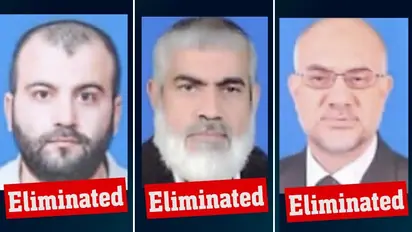ELIMINATED! Head of Hamas Govt in Gaza Strip among 3 leaders killed in airstrike, claims Israel; details here

Synopsis
The Israeli military announced Thursday that it killed three senior Hamas leaders in an airstrike approximately three months ago, an operation that has now come to light.
The Israeli military announced Thursday that it killed three senior Hamas leaders in an airstrike approximately three months ago, an operation that has now come to light. The military identified the individuals as Rawhi Mushtaha, Sameh al-Siraj, and Sameh Oudeh, stating that they were killed in a strike on an underground compound in northern Gaza. This compound was described as a command and control center for Hamas operations.
According to the military, Mushtaha served as the head of the Hamas government in the Gaza Strip, while al-Siraj held significant roles in Hamas’ political bureau and labor committee. Oudeh was identified as the commander of Hamas' general security mechanism. The military alleged that the airstrike targeted the fortified underground compound where these leaders had taken refuge, emphasizing that the elimination of these figures was crucial for ongoing security operations against Hamas.
Israel claimed that Hamas chose not to announce the deaths to avoid damaging the morale of its operatives, which they suggested indicates the impact of the operation.
"Approximately 3 months ago, in a joint IDF and ISA strike in Gaza, the following terrorists were eliminated: Rawhi Mushtaha, the Head of the Hamas government in Gaza, Sameh al-Siraj, who held the security portfolio on Hamas' political bureau and Hamas' Labor Committee and Sami Oudeh, Commander of Hamas' General Security Mechanism," the IDF said in a statement.
"IAF fighter jets struck and eliminated the terrorists while they were hiding in a fortified and equipped underground compound in northern Gaza. The compound served as a Hamas command and control center and enabled senior operatives to remain inside of it for extended periods of time," it further stated.
"The IDF will continue to pursue all of the terrorists responsible for the October 7 massacre and will operate against anyone who threatens the State of Israel," the statement concluded.
This operation comes amid an intensifying military campaign in the region that has resulted in significant casualties. According to Hamas-led authorities, the death toll from Israel’s military actions in Gaza has exceeded 40,000, with more than 90,000 individuals reported injured. The Lebanese government has also reported around 1,000 deaths and 6,000 injuries from recent Israeli strikes against Iran-backed militant group Hezbollah. The conflict escalated following the surprise attack by Hamas on October 7, 2023, which prompted Israel's extensive military response.
The announcement coincided with strong statements from regional leaders, including the Emir of Qatar, Sheikh Tamim bin Hamad Al-Thani. He criticized Israel for what he termed a “collective genocide” against the Palestinian people and neighboring countries. The emir emphasized that lasting peace in the region is unattainable without the establishment of a Palestinian state, calling for serious ceasefire efforts to halt Israeli aggression, particularly in Lebanon.
The political landscape in Israel complicates these peace efforts, as several members of Prime Minister Benjamin Netanyahu’s coalition oppose a two-state solution. Finance Minister Bezalel Smotrich has publicly declared that thwarting the creation of a Palestinian state is his “life’s mission.”
Since the onset of the conflict, Qatar has played a role in facilitating ceasefire negotiations alongside Egypt and the United States. While a limited ceasefire and some hostage releases were achieved late last year, broader negotiations over the last ten months have seen little progress. As tensions continue to mount, the situation in the region remains precarious, with both military operations and diplomatic efforts ongoing.
Check the Breaking News Today and Latest News from across India and around the world. Stay updated with the latest World News and global developments from politics to economy and current affairs. Get in-depth coverage of China News, Europe News, Pakistan News, and South Asia News, along with top headlines from the UK and US. Follow expert analysis, international trends, and breaking updates from around the globe. Download the Asianet News Official App from the Android Play Store and iPhone App Store for accurate and timely news updates anytime, anywhere.